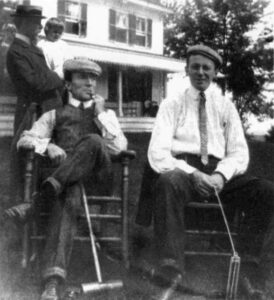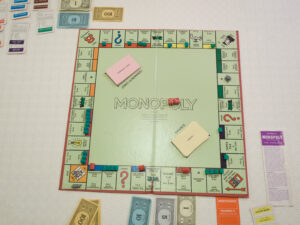By Sharon Oliver, Contributing Writer

MEDFORD – One of the country’s most iconic board game companies started with a game created by a teenager in his family’s home in this small city north of Boston.
Early days
Founded in 1883 by George Swinnerton Parker in Medford, Parker Brothers (originally named the George S. Parker & Company) toy and game manufacturer published more than 1,800 games and built a board game empire for the Parker family. Two brothers would later join the company: Charles, in 1888 and older brother Edward in 1898. The company remained a family-owned and operated business until 1968 when General Mills purchased it.
George created his first game, “Banking,” in 1883 at age 16. The brothers enjoyed playing “Banking” so much until George had 500 copies printed up and sold to Boston area retailers. The finance game consisted of 160 cards where players borrow money from the bank and try to generate wealth by guessing their failure or success.
Ironically, the Parker brothers’ father, a sea captain, lost most of his money in the panic of 1873, which stemmed from an ailing economy and resulted in failed banks and business closures. The family patriarch died when George was 10, forcing him, his widowed mother and two brothers to move to Medford, where they lived with an aunt and uncle in an 18-room house. One of those rooms had shelves filled with board games, something that was relatively new for Puritans. Liberal Puritans only tolerated one early board game called “The Mansion of Happiness: An Instructive Moral and Entertainment Amusement,” which was first released in the U.S. in 1843. Parker Brothers would later buy the rights to the game and republish it in 1894.
“Monopoly” becomes a runaway hit

“Banking” was followed up by two other games: “Famous Men” and “Baker’s Dozen,” a board game designed by one of George’s teachers. In 1885, he published four more card games: “The Dickens Game,” “Ivanhoe,” “Speculation,” and “Great Battlefields.” George designed most of the games and wrote all the rules for several years and many of the games were based upon important events of the day and designed to educate and entertain. For example, “War in Cuba” was about the impeding Spanish-American War and “Klondike” was based on the Klondike Gold Rush. Parker Brothers later published classics like “Clue,” “Trivial Pursuit” and of course their biggest money-maker, “Monopoly.” Incidentally, the “Clue” murder mystery game was based on the house in Peterborough, New Hampshire that George Parker and his wife Grace owned.
After realizing he was good at selling and developing games, George hired his first employee and rented a store in Salem for $12.50 a month in 1887. As the game industry grew, the company grew profitably and was a mainstay employer in Salem. In 1906, Parker Brothers published the game “Rock” which became the bestselling game in the nation. Parker Brothers released “Monopoly” during the Great Depression, which was a time when so many companies went out of business. Nevertheless, the company put all their resources behind marketing it. Originally rejected in 1934, they published it the next year and the game was so successful the company had trouble keeping up with demand and was saved from becoming another casualty of the Great Depression.
Acquisition and consolidation
In 1985, General Mills merged the company with their subsidiary Kenner who was eventually acquired by Tonka in 1987. Tonka, including Parker Brothers, was purchased in 1991 for approximately $516 million by Hasbro, which also owned the Milton Bradley Company. Milton Bradley and Parker Brothers later turned into two separate brands of Hasbro before being retired in 2009 under the Hasbro brand and the Parker Brothers facility in Salem closed.
George Parker, whose teenage creations launched a wildly successful business and some of the most popular board games ever, died in 1953 at age 86.
RELATED CONTENT:
How Earl Tupper turned one product into a household name (fiftyplusadvocate.com)
Boston salesman King Camp Gillette changed the way the world shaves (fiftyplusadvocate.com)
The Massachusetts man who created America’s doughnut habit (fiftyplusadvocate.com)












